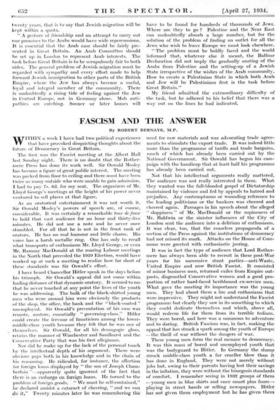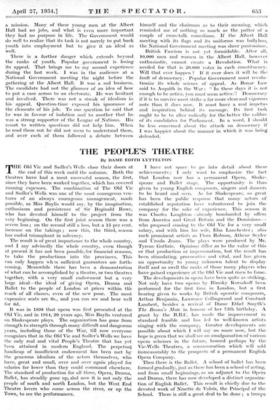FASCISM AND THE ANSWER
By ROBERT BERNAYS, M.P.
WITHIN a week I have had two political experiences that have provoked disquieting thoughts about the future of Democracy in Great Britain.
The first was the Fascist meeting at the Albert Hall last Sunday night. There is no doubt that the Rother- mere Press has done its work well. Sir Oswald Mosley has become a figure of great public interest. The meeting was packed from floor to ceiling and there must have been twice as many outside who were unable to gain admission. I had to pay 7s. 6d. for my seat. The organizers of Mr. Lloyd George's meetings at the height of his power never ventured to sell places at that figure. - As an oratorical entertainment it was not worth it. Sir Oswald Mosley's powers of speech are, of course, considerable. It was certainly a remarkable tour de force to hold that vast audience for an hour and thirty-five minutes. He did not use a note and he never once stumbled. For all that. he is not in the front rank of orators. He has no real humour and little charm. His voice has a harsh metallic ring. One has only to recall what transports of enthusiasm Mr. Lloyd George, or even Mr. Ramsay MacDonald at the roaring Labour meetings in the North that preceded the 1929 Election, would have worked up at such a meeting to realize how far short of these standards was Sir Oswald's effort.
I have heard Chancellor Hitler speak in the days before his triumph. Sir Oswald's appeal did not conic within hailing distance of that dynamic oratory. It seemed to me that he never touched at any point the lives of the youth he was addressing. The bulk of the black-shirted young men who were around him were obviously the products of the shop, the office, the bank and the " black-coated " unemployed. Sir Oswald's presentation of his case was remote, austere, essentially " governing-class." Hitler could create the fervour of fanaticism among the lower- middle-class youth because they felt that he was one of themselves. Sir Oswald, for all his demagogic gloss, retains the manner of Winchester and Sandhurst and the Conservative Party that was his first allegiance.
Nor did he make up for the lack of the personal touch by the intellectual depth of his argument. There were obvious gaps both in his knowledge and in the chain of his reasoning. He ridiculed, for instance, the affection for foreign loans displayed by " the son of Joseph Cham- berlain "—apparently quite ignorant of the fact that there is an embargo on foreign loans. He turned to the problem of foreign goods. " We must be self-contained," he declared amidst a cataract of cheering, " and we can do it," Twenty minutes later he was remembering the need for raw materials arid was advocating trade agree- ments to stimulate the export trade. It was indeed little more than the programme of tariffs and trade bargains, much of which has already been carried out by the National Government. Sir Oswald has begun his cam- paign with the handicap that at least half his programme has already been carried out.
Not that his intellectual arguments really mattered. The audience was not really interested in them. What they wanted was the full-blooded gospel of Dictatorship maintained by violence and fed by appeals to hatred and prejudice. Any contemptuous or wounding reference to the leading politicians or the bankers was cheered and cheered again. Passages in his speech about the alleged " sloppiness " of Mr. MacDonald or the supineness of Mr. Baldwin or the sinister influences of the City of London sent the audience into a delirium of enthusiasm. It was clear, too, that the ceaseless propaganda of a section of the Press against the institutions of democracy had not missed its mark. Attacks on the House of Com- mons were greeted with enthusiastic jeering.
It was in fact the type of audience that Lord Rother- mere has always been able to recruit in these post-War years for his successive stunt parties—anti-Waste, 'United Empire and now British Fascist. It consisted of minor business men, returned exiles from Empire out- posts, disgruntled Conservative women and a good pro- portion of rather hard-faced beribboned ex-service men. What gave the meeting its importance was the young men. They had about them a fire and enthusiasm that were impressive. They might not understand the Fascist programme but clearly they saw in its something to which they could dedicate themselves and which, above all, would redeem life for them from its terrible tedium. They were bored, and here was a summons to adventure and to daring. British Fascism was, in fact, making the appeal that has struck a spark among the youth of Europe —the thrill of war without the dangers of war.
These young men form the real menace to democracy. It was this mass of bored and unemployed youth that was the bodyguard to Hitler. In Germany the slump struck middle-class youth a far crueller blow than it has done in England. They were not merely without jobs but, owing to their parents having, lost their savings in the inflation, they were without the bourgeois standards of comfort. I remember seeing in 1932 groups of them —young men in blue shirts and once smart plus fours—: playing in street bands or selling newspapers. 'Hitler has not given them employment but he has given- them a mission. Many of these young men at the Albert Hall had no jobs, and what is even more important they had no purpose in life. The Government would do well to realize that its task is not merely to put back youth • into employment but to give it an ideal as well. • There is a further danger which extends beyond the ranks of youth. Popular government is losing its appeal. That brings me to my second experience during the last week. I was in the audience at a National Government meeting the night before the gathering at the Albert Hall. It was a sad business. The candidate had not the glimmer of an idea of how to put a case across to an electorate. He was hesitant and involved. There was not a streak of idealism in his appeal. Question-time exposed his ignorance of the elements of his job. To one question he said that he was in favour of isolation and to another that he was a strong supporter of the League of Nations. His resort to written questions did not help him. When he read them out he did not seem to understand them, and over each of them followed a debate between himself and the chairman as to their meaning, which reminded me of nothing so much as the patter of a couple of cross-talk comedians. If the Albert Hall meeting with its flags and its uniforms was ballyhoo, the National Government meeting was sheer pantomime.
British Fascism is not • yet formidable. After all, 10,000 men and women in the Albert Hall, however enthusiastic, cannot create a Revolution. What is needed for that is 20,000 votes in each constituency. Will that ever happen ? If it ever does it will be the fault of democracy. Popular Government must revolu- tionize its whole science of appeal. As Bonar Law said to Asquith in the War : " In these days it is not enough to be active, you must seem active.': Democracy if it is to survive must strike a far more clear and vigorous note than it does now. It must have a real impetus and inspiration behind its message. Its first task ought to be to alter radically for the better the calibre of its candidates for Parliament. In a word, I should be less concerned about the attack on democracy if I was happier about the manner in which it was being defended.













































 Previous page
Previous page